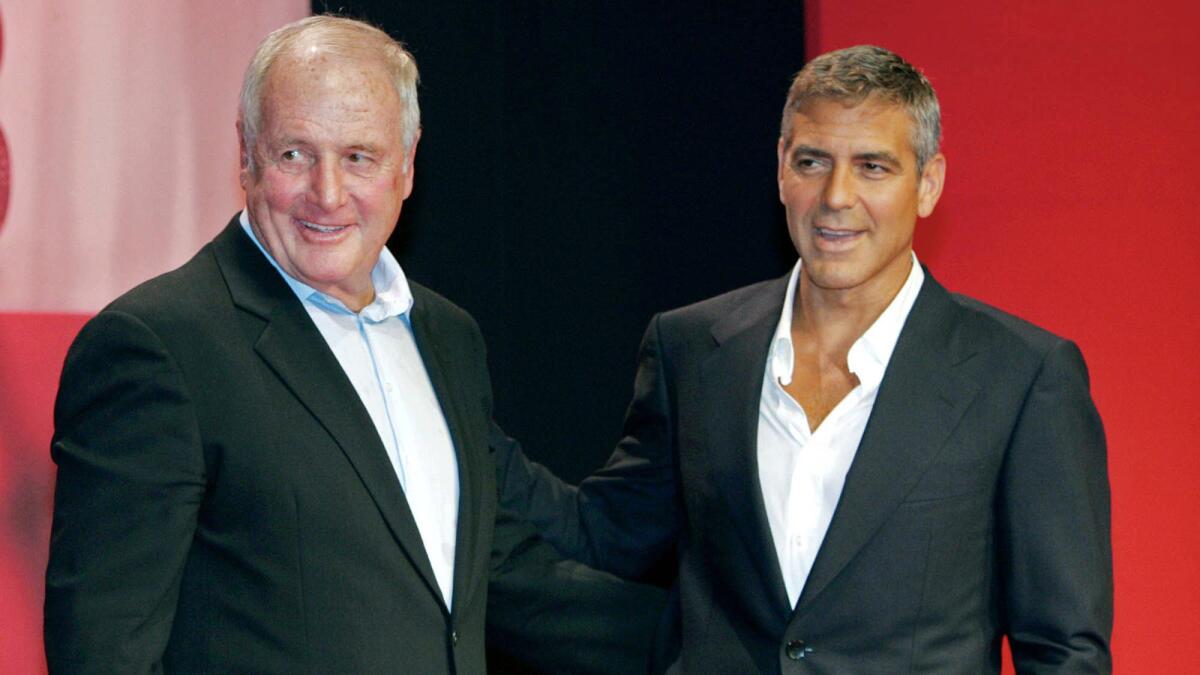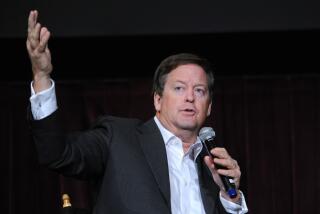Jerry Weintraub dies: For longtime producer, a zeal buttressed by swagger

Jerry Weintraub, left, poses with actor George Clooney during a press conference in Tokyo to promote the film “Ocean’s Thirteen.”
- Share via
In a town that was once filled with colorful characters, Jerry Weintraub was downright iridescent.
The longtime producer, who on Monday died unexpectedly at age 77 (you can read The Times’ obituary here), promoted the likes of Bob Dylan and Led Zeppelin, produced film staples such as “Diner,” “Nashville” and “Ocean’s Eleven” and had an unusual domestic-living situation, to say the least.
He was working away right up until his death, He executive produced the foreign-policy satire “The Brink,” currently on HBO--the Roberto and Kim Benabib series deals with a foreign-service flunky (Jack Black) and a vice-prone Secretary of State (Tim Robbins) during a crisis in Pakistan. He was also behind the upcoming “Tarzan” reboot and HBO SF series “Westworld.”
He remained at his most freewheeling, swaggery best in the last months of his life--fittingly, for a man who titled his memoir “When I Stop Talking You’ll Know I’m Dead.” In an interview for “The Brink” at the end of April, he offered to The Times his theories about the show, Hollywood and general world matters.
Among some of the choicer nuggets of that conversation:
“I know every prime minister in Israel and every Saudi Arabian king, and I know the area and the geography and the people. It’s a cliché that some of my best friends are Arabs and some of my best friends are from the Middle East, but I understand the lifestyle and the mindset. And this show rang very, very true to me.”
On the boundaries of taste:
“You can’t go too far. There are certain things I don’t agree with, philosophically and politically, but you can’t really go too far if you try to stick to the truth. You can show the absurdity of it all, the absurdity that [foibles] are happening on both sides. When Altman made “MASH,” they made fun of people’s arms getting knocked off. And it was funny somehow. He found a way to make it funny.
On consulting with his numerous Washington contacts for “The Brink:”
“They would all love to have input, they would all love to see themselves a certain way, but we’re not showing it the way they want to see themselves, we’re showing it the way we want to show them. This is a commercial venture; we’re not doing this to change the world. So I don’t care what they think about what we did. I care as much as the guy who just brought me coffee cares.”
That said, he said he did show an episode of the series to a former president. (The guess would be George H.W. Bush, given their close friendship, but he wouldn’t identify the leader.)
“I won’t tell you who, but he got a big laugh out of it. Tim Robbins in bed with a hooker! And he told me which Secretary of State he thought might do something like that.”
On his producing approach, a can-do attitude mixed with a little screw-you stubbornness:
“If someone is saying that something you believe in wouldn’t be successful, you need to find people who have the guts to go ahead and do it. It took 15 years to make “Liberace” [“Behind the Candelabra”] and I had Matt Damon and Michael Douglas and Steven Soderbergh. That’s an A-plus crowd and I still couldn’t get the … thing made.”
Maybe most telling of his life and work is what he said about his feeling when he first got the script for “The Brink.” You might think someone who had his years of grizzled experience would be tired by that aspect of the game. But he said some of that joy remained—perhaps even more so in his later years.
“I read so many things I hate,” he said, “that when I read something I love I want to run out and make it. Which is what I did.”
He went on to offer his larger life philosophy.
“I’ve been turned down with everything I ever tried to do a hundred times. When I made [gay cult film] “Cruising,” they thought I was out of my out of mind. It was like climbing a mountain with ice on it. The gay community wanted to kill me. But anything that happens in life can be examined on film, and should be examined on film, and that’s what I’ve always tried to do.”
More to Read
Only good movies
Get the Indie Focus newsletter, Mark Olsen's weekly guide to the world of cinema.
You may occasionally receive promotional content from the Los Angeles Times.











